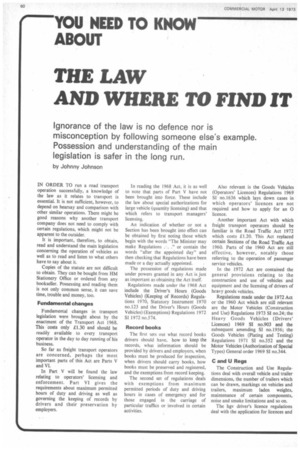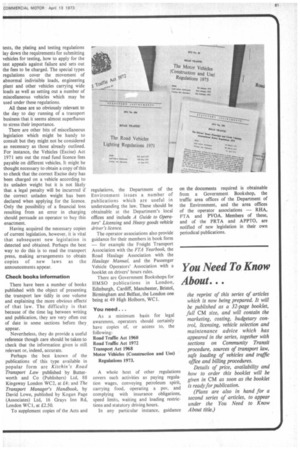THE LAW AND WHERE TO FIND IT
Page 62

Page 63

If you've noticed an error in this article please click here to report it so we can fix it.
Ignorance of the law is no defence nor is misconception by following someone else's example. Possession and understanding of the main legislation is safer in the long run.
by Johnny Johnson
IN ORDER TO run a road transport operation successfully, a knowledge of the law as it relates to transport is essential. It is not sufficient, however, to depend on hearsay and comparison with other similar operations. There might be good reasons why another transport company does not need to comply with certain regulations, which might not be apparent to the outsider.
It is important, therefore, to obtain, read and understand the main legislation concerning the operation of vehicles as well as to read and listen to what others have to say about it Copies of the statute are not difficult to obtain. They can be bought from HM Stationery Office or ordered from any bookseller. Possessing and reading them is not only common sense, it can save time, trouble and money, too.
Fundamental changes
Fundamental changes in transport legislation were brought about by the enactment of the Transport Act 1968. This 'costs only £1.30 and should be readily available to every transport operator in the day to day running of his business.
So far as freight transport operators are concerned, perhaps the most important parts of this Act are Parts V and VI.
In Part V will be found the law relating to operators' licensing and enforcement. Part VI gives the requirements about maximum permitted hours of duty and driving as well as governing the keeping of records by drivers and their preservation by employers. In reading the 1968 Act, it is as well to note that parts of Part V have not been brought into force. These include the law about special authorizations for large vehicle (quantity licensing) and that which refers to transport managers' licensing.
An indication of whether or not a Section has been brought into effect can be obtained by first noting those which begin with the words "The Minister may make Regulations ." or contain the words "after the appointed day" and then checking that Regulations have been made or a day actually appointed.
The possession of regulations made under powers granted in any Act is just as important as obtaining the Act itself.
Regulations made under the 1968 Act include the Driver's Hours (Goods Vehicles) (Keeping of Records) Regulations 1970, Statutory Instrument 1970 no.123 and the Driver's Hours (Goods Vehicles) (Exemptions) Regulations 1972 SI 1972 no.574.
Record books
The first sets out what record books drivers should have, how to keep the records, what information should be provided by drivers and employers, when books must be produced for inspection, when drivers should carry books, how books must be preserved and registered, and the exemptions from record keeping.
The second set of regulations deals with exemptions from maximum permitted periods of duty and driving hours in cases of emergency and for those engaged in the carriage of particular traffics or involved in certain activities. Also relevant is the Goods Vehicles (Operators' Licences) Regulations 1969 SI no.1636 which lays down cases in which operators' licences are not required and how to apply for an 0 licence.
Another important Act with which freight transport operators should be familiar is the Road Traffic Act 1972 which costs £1.20. This Act replaced certain Sections of the Road Traffic Act 1960. Parts of the 1960 Act are still effective, however, notably those referring to the operation of passenger service vehicles.
In the 1972 Act are contained the general provisions relating to the construction and use of vehicles and equipment and the licensing of drivers of heavy goods vehicles.
Regulations made under the 1972 Act or the 1960 Act which are still relevant are the Motor Vehicles (Construction and Use) Regulations 1973 SI no.24; the Heavy Goods Vehicles (Drivers' Licences) 1969 SI no.903 and the subsequent amending Si no.1956; the Goods Vehicles (Plating and Testing) Regulations 1971 SI no.352 and the Motor Vehicles (Authorization of Special Types) General order 1969 SI no.344.
C and U Regs
The Construction and Use Regulations deal with overall vehicle and trailer dimensions, the number of trailers which can be drawn, markings on vehicles and trailers, maximum laden weights, maintenance of certain components, noise and smoke limitations and so on.
The hgv driver's licence regulations deal with the application for licences and tests, the plating and testing regulations lay down the requirements for submitting vehicles for testing, how to apply for the test appeals against failure and sets out the fees to be charged. The special types regulations cover the movement of abnormal indivisible loads, engineering plant and other vehicles carrying wide loads as well as setting out a number of miscellaneous vehicles which may be used under these regulations.
All these are so obviously relevant to the day to day running of a transport business that it seems almost superfluous to stress their importance.
There are other bits of miscellaneous legislation which might be handy to consult but they might not be considered as necessary as those already outlined. For instance, the Vehicles (Excise) Act 1971 sets out the road fund licence fees payable on different vehicles. It might be thought necessary to obtain a copy of this to check that the correct Excise duty has been charged on a vehicle according to its unladen weight but it is not likely that a legal penalty will be incurrred if the correct unladen weight has been declared when applying for the licence.
Only the possibility of a financial loss resulting from an error in charging should persuade an operator to buy this enactment.
Having acquired the necessary copies of current legislation, however, it is vital that subsequent new legislation is detected and obtained. Perhaps the best way to do this is to read the transport press, making arrangements to obtain copies of new laws as the announcements appear.
Check books information There have been a number of books published with the object of presenting the transport law tidily in one volume and explaining the more obvious effects' of that law. The difficulty is that because of the time lag between writing and publication, they are very often out of date in some sections before they appear.
Nevertheless, they do provide a useful reference though care should be taken to check that the information given is still relevant or, indeed, accurate.
Perhaps the best known of the publications of this type available in popular form are Kitchin's Road Transport Law published by Butterworth and Co (Publishers) Ltd, 88 Kingsway London WC2, at .£4: and The Transport Manager's Handbook, by David Lowe, published by Kogan Page (Associates) Ltd, 16 Grays Inn Rd, London WC I, at £2.50.
To supplement copies of the Acts and
regulations, the Department of the Environment issues a number of publications which are useful in understanding the law. These should be obtainable at the Department's local offices and include A Guide to Operators' Licensing and Heavy goods vehicle driver's licence The operator associations also provide guidance for their members in book form — for example the Freight Transport Association with the PTA Yearbook, the Road Haulage Association with the Haulage Manual, and the Passenger Vehicle Operators' Association with a booklet on drivers' hours rules.
There are Government Bookshops for HMSO publications in London, Edinburgh, Cardiff, Manchester, Bristol, Birmingham and Belfast, the London one being at 49 High Holborn, WC1.
You need . . .
As a minimum basis for legal awareness, operators should certainly have copies of. or access to, the following: Road Traffic Act 1960 Road Traffic Act 1972 Transport Act 1968 Motor Vehicles (Construction and Use) Regulations 1973.
A whole host of other regulations covers such activities as paying regulation wages, conveying petroleum spirit, carrying food, operating a psv, and complying with insurance obligations, speed limits, waiting and loading restrictions and statutory driving hours.
In any particular instance, guidance on the documents required is obtainable from a Government Bookshop, the traffic area offices of the Department of the Environment, and the area offices of the operator associations — RHA, PTA and PVOA. Members of' these, and of the PRTA and APPTO, are notified of new legislation in their own periodical publications.
























































































































